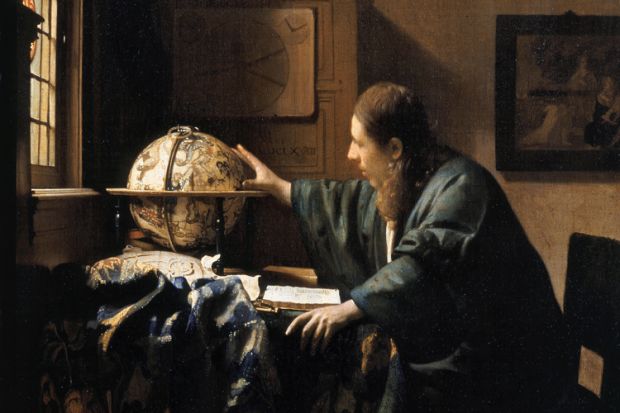“The days of scholarship for its own sake are over.”
Those words might sound like craven and philistine kowtowing to the “impact” agenda, but David Freedberg, the new director of the Warburg Institute, is unapologetic.
To hear them uttered by the Warburg’s chief will, however, surprise many of the academics who have visited its famous open-stack library in Bloomsbury’s Woburn Square.
The institute, part of the University of London’s School of Advanced Study, has long been regarded by many scholars as unashamedly high-minded and gloriously untouched by the need to make spurious cases for the relevance of its humanities research, which is largely centred on antiquity and the Renaissance.
But what has been seen by some as the Warburg’s narrow focus and failure to engage more widely or demonstrate its relevance is no longer tenable, believes Freedberg, who has arrived this autumn from Columbia University, where he was Pierre Matisse professor of the history of art.
“We need to retain our commitment to the humanities, but show our relevance and acknowledge the world does not owe us a living,” he says.
Forging closer links with scholars in the sciences and social sciences will help to restore the standing of the Warburg, which Freedberg fears has fallen sharply in the UK in recent times as the institute increasingly concentrated on Renaissance studies.
“People are very afraid that I am selling out to the sciences because they’re getting the money,” he says. “But they are getting the money because there is a sense of excitement [around science].”
Changing the institute’s mindset had elicited some resistance as it is “a major step change for the institution”, he admits. But the new outward-looking approach is needed to stop the Warburg’s “slide into obscurity”, he believes.
“I didn’t come over from New York to run a place just to satisfy the fantasies of a few people,” he says of the Warburg’s “abstruse, but high-standard” output in recent years.
Promoting an interdisciplinary approach is also consistent with the vision of Aby Warburg, the institute’s eccentric founder, who collected works on wide-ranging subjects from astrology and folklore to magic and the history of science.
Regarded by many as one of the 20th century’s intellectual giants, the scion of a German-Jewish banking dynasty used his family’s vast wealth to establish one of the world’s foremost libraries, which was moved from Hamburg to London in 1933 to escape Nazi Germany.
Run by Warburg’s disciples, the institute later attracted some of the era’s greatest humanist thinkers – including Erwin Panofsky, Walter Benjamin and Edgar Wind – moving to its current home in 1944.
Freedberg, who left his native South Africa for political reasons aged 18 to study at Yale University and take his PhD at the University of Oxford, has fond memories of the library during his time as a lecturer in London in the early 1970s.
“I was hired by the Courtauld Institute but I was here every day,” he recalls.
That was mainly because his mentor, the Austrian émigré art historian Ernst Gombrich, ran the institute at the time – which Freedberg regards as the Warburg’s last heyday.
“The decline of the Warburg since the days of Gombrich has been precipitous because the institute has gone further and further away from the Warburg project,” says Freedberg.
“The Warburg was the world’s first interdisciplinary institute…it has been betrayed over the past 30 years,” he adds.
The focus on the humanities’ links to science would seem, however, to favour the more scientific-inclined agenda of Gombrich, rather than the quirky and esoteric subjects pursued by Warburg himself.
“Warburg was very interested in the superstitious and the barbaric side of mankind, which he felt explained modern culture – Gombrich hated all that superstition,” Freedberg says.
Therefore, as much as reconnecting with the Aby Warburg project, Freedberg also seems intent on emulating his old mentor and the interdisciplinary approach he was then pioneering.
“He wrote the only book on the humanities which engaged with the sciences,” he explains of Gombrich's seminal 1960 work Art and Illusion.
Gombrich was also a popular communicator: his books on art history could be widely read by the public. Therefore, Warburg scholars should be engaging in the same way to address contemporary issues, Freedberg suggests.
For instance, some of its scholars on Islam might be able to add to the public debate on why Islamic State are destroying temples in Syria, drawing on the history of iconoclasm, he suggests.
Freedberg also hopes to appoint a writer-in-residence and possibly a contemporary artist-in-residence to make the institute “more inclusive, broader and much more contemporary”.
And he hopes to raise money via philanthropy to employ new scholars to further his research ambitions for the institute.
Final chapter: line drawn under Warburg legal battle
A short statement issued last week appears to have drawn a line under a long-running legal battle over the Warburg’s future.
In a joint statement issued by the institution and the University of London on 5 October, it relates that “all remaining legal issues between them [have been] resolved amicably”.
The legal case between the parties had focused on an estates charge by the university, which more than doubled around 2007-08, that the university said reflected the full economic cost of running the institute.
The Warburg claimed that the charge, plus the withdrawal of other funds, made the institute’s position untenable and was a breach of the 1944 deed of trust that set up the institute at the university, which said it should be “adequately equipped and staffed as an independent unit”.
In a judgment handed down in the High Court last November, Mrs Justice Proudman found “the levying of space charges…is not, to my mind, permissible”, although both sides claimed victory.
The university was given leave to appeal parts of the decision, but has now concluded the affair through an out-of-court agreement.
POSTSCRIPT:
Print headline: ‘Step change is needed to prevent slide into obscurity’
Register to continue
Why register?
- Registration is free and only takes a moment
- Once registered, you can read 3 articles a month
- Sign up for our newsletter
Subscribe
Or subscribe for unlimited access to:
- Unlimited access to news, views, insights & reviews
- Digital editions
- Digital access to THE’s university and college rankings analysis
Already registered or a current subscriber?




